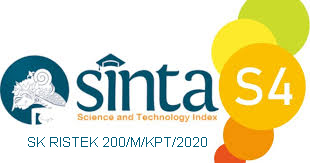Online Monitoring and Analysis of Lube Oil Degradation for Gas Turbine Engine using Recurrent Neural Network (RNN)
Abstract
Keywords
Full Text:
PDFReferences
Kurz, R., Meher-Homji, C., Fellow, B., Manager, J. M., & Gonzalez, F., “GAS TURBINE PERFORMANCE AND MAINTENANCE”, Proceedings of the Forty-Second Turbomachinery Symposium, 2013, Turbomachinery Laboratory, Texas A&M Engineering Experiment Station.
Nehal S. Ahmed and Amal M. Nassar (May 22nd, 2013). Lubrication and Lubricants, Tribology - Fundamentals and Advancements, Jürgen Gegner, IntechOpen, DOI: 10.5772/56043.
Benbouzid, M., Berghout, T., Sarma, N., Djurović, S., Wu, Y., & Ma, X. (2021). Intelligent condition monitoring of wind power systems: State of the art review. In Energies (Vol. 14, Issue 18). MDPI. https://doi.org/10.3390/en14185967
S. Yi, N. Zhao, S. Li and Z. Xu, "A study on fault diagnostic method for the lube oil system of gas turbine based on rough sets theory," 2014 11th International Conference on Fuzzy Systems and Knowledge Discovery (FSKD), 2014, pp. 42-48, doi: 10.1109/FSKD.2014.6980804.
L. Ciani, G. Guidi and G. Patrizi, "Condition-based Maintenance for Oil&Gas system basing on Failure Modes and Effects Analysis," 2019 IEEE 5th International forum on Research and Technology for Society and Industry (RTSI), 2019, pp. 85-90, doi: 10.1109/RTSI.2019.8895587.
Xiaoliang Zhu, Chong Zhong, Jiang Zhe, Lubricating oil conditioning sensors for online machine health monitoring – A review,Tribology International, Volume 109, 2017, Pages 473-484, ISSN 0301-679X, https://doi.org/10.1016/j.triboint.2017.01.015.
Petneházi, G. (2018). Recurrent Neural Networks for Time Series Forecasting. http://arxiv.org/abs/1901.00069
Chatterjee Chandra, (15 December 2021), URL: https://towardsdatascience.com/implementation-of-rnn-lstm-and-gru-a4250bf6c090
Manaswi, N. K. (2018). Deep Learning with Applications Using Python. Apress.
Gholamy, A., Kreinovich, V., & Kosheleva, O. (2018). A Pedagogical Explanation A Pedagogical Explanation Part of the Computer Sciences Commons. https://scholarworks.utep.edu/cs_techrephttps://scholarworks.utep.edu/cs_techrep/1209
Aditya, (15-December-2021). URL: https://www.kaggle.com/adityadesai13/used-car-dataset-ford-and-mercedes/code
USENIX Association., ACM SIGMOBILE., ACM Special Interest Group in Operating Systems., & ACM Digital Library. (2005). Papers presented at the Workshop on Wireless Traffic Measurements and Modeling: June 5, 2005, Seattle, WA, USA. USENIX Association. https://www.tensorflow.org/tutorials/structured_data/time_series . https://doi.org/10.5281/zenodo.4724125
Chandra, R., Goyal, S., & Gupta, R. (2021). Evaluation of Deep Learning Models for Multi-Step Ahead Time Series Prediction. IEEE Access, 9, 83105–83123. https://doi.org/10.1109/ACCESS.2021.3085085
Qi, J., Du, J., Siniscalchi, S. M., Ma, X., & Lee, C.-H. (2020). On Mean Absolute Error for Deep Neural Network Based Vector-to-Vector Regression. https://doi.org/10.1109/LSP.2020.3016837
Alabi, O., Wilson, R., Adegbotolu, U., & Kudehinbu, S. (2019). SPE-195708-MS Realtime Lubricating Oil Analysis to Predict Equipment Failure.
DOI: https://doi.org/10.31326/jisa.v5i1.1108
Refbacks
- There are currently no refbacks.
Copyright (c) 2022 Febrianto Nugroho, Rusdianto Roestam

This work is licensed under a Creative Commons Attribution-ShareAlike 4.0 International License.
JOURNAL IDENTITY
Journal Name: JISA (Jurnal Informatika dan Sains)
e-ISSN: 2614-8404, p-ISSN: 2776-3234
Publisher: Program Studi Teknik Informatika Universitas Trilogi
Publication Schedule: June and December
Language: Indonesia & English
APC: The Journal Charges Fees for Publishing
Indexing: EBSCO , DOAJ, Google Scholar, Arsip Relawan Jurnal Indonesia, Directory of Research Journals Indexing, Index Copernicus International, PKP Index, Science and Technology Index (SINTA, S4) , Garuda Index
OAI address: http://trilogi.ac.id/journal/ks/index.php/JISA/oai
Contact: jisa@trilogi.ac.id
Sponsored by: DOI – Digital Object Identifier Crossref, Universitas Trilogi
In Collaboration With: Indonesian Artificial Intelligent Ecosystem(IAIE), Relawan Jurnal Indonesia, Jurnal Teknologi dan Sistem Komputer (JTSiskom)
JISA (Jurnal Informatika dan Sains) is Published by Program Studi Teknik Informatika, Universitas Trilogi under Creative Commons Attribution-ShareAlike 4.0 International License.


















